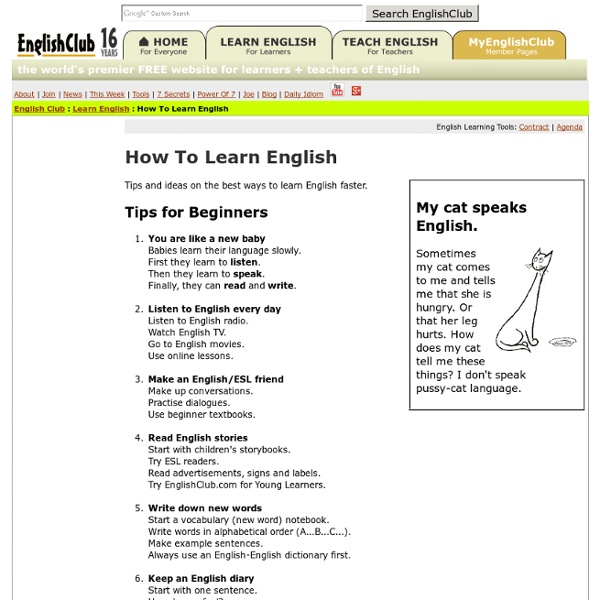Language In Use
It is great to show and offer students many examples of English language in use. Meaning, students appreciate that there are many ways to say the same thing and like to see the "nuance" of the English language. Here are some images showing different ways / expressions to communicate a similar thing.
How to Learn English: 15 Steps
wikiHow is a “wiki,” similar to Wikipedia, which means that many of our articles are co-written by multiple authors. To create this article, 195 people, some anonymous, worked to edit and improve it over time. This article has been viewed 2,932,066 times. Co-authors: 195 Updated: September 14, 2021 Views: 2,932,066 Article SummaryX To learn English, try taking a class to learn the foundational skills from a trained professional that speaks your native language. Did this summary help you?
First Day (or First Week) Activities, Icebreakers, or Introductory Activities for ESL Classes | Eslkevin's Blog
If you are interested in online sites for yourself or your students, you can check out this page: Introducing Your ESL or EFL Students to Online Tutorials and Quizzes .–kas First Day (Week) Activities or Introductory Activities for ESL Classes Shared by Kevin Stoda and many others It is a new school (or college) term and it is time for ESL students and teachers to make new resolutions and preparations for the semester (or school year–for some). I was recently asked to come up with a list of icebreakers and first day (or first week) activities for students and new EFL (ESL) classes at the institution I am working at. I like to use a variety of bingo games, too. (1) You could try a “true or false” game. Get each student to write three statements about themselves. eg: 1. One is false…. (2) Find the person Level: Intermediate Language: asking questions Procedures: 1. (3) Names A to Z This activity is good for introductions and for practicing the alphabet. (4) Snowball Fight Whats your name?
Tips
Teach 9 irregular verbs in one lesson
It is much more memorable to teach or learn irregular verbs in a story. The verbs, especially their meaning, are easier to remember and retrieve from memory. Moreover, teaching verbs in a story is fun. In this post there are several activities: a mind map, a worksheet, an MP3 drill and an interactive quiz. These activities will make the teaching and learning enjoyable and fun. ADVERT: Irregular verbs – infographics Here is the picture of the story: Print version of the story and tasks:past simple story_fishing full Here, you can print out the mind map with all the irregular verbs. Once you think that you know the verbs you can try out the following interactive quiz. MP3 drill Listen say the word that belongs there instead of the beep. Irregular verbs – mp3 drill The worksheet contains the grammar up activity. If you like this activity and you would like to use in either on your website or in a classroom without an internet connection, you can do so by downloading the files here:
Páginas on line de repaso
How To Use Delicious For My Business? | Social Media In 7 Minutes
How to Use Delicious Delicious is a pretty new social media platform with a brand new way for people to share what they are surfing, particularly their bookmarks, which are the sites that they frequent the most, so before we go into how to use Delicious lets take a look at what it is exactly first. How to Use Delicious | What’s Its Purpose? Delicious describes itself as a Social Bookmarking service. When I first browsed Delicious’s homepage it looked pretty similar to Digg, but after further speculation I began to see why learning how to use Delicious was essential. How to Use Delicious | What Can You Do With Delicious? Bookmark any site on the Internet, and get to it from anywhere Instead of having different bookmarks on every computer, Delicious makes it easy to have a single set of bookmarks kept in sync between all of your computers. Share your bookmarks, and get bookmarks in return Discover the most useful and interesting bookmarks on the web How to Use Delicious | Two Great Tips
Games
Infografías de inglés
Infografías de inglés He reunido mis 50 infografías favoritas en un solo PDF. EL PDF incluye temas de expresiones y collocations, lecciones varias y gramática. Te dejo el índice para que veas lo que te puedes llevar por solo 2.99€. (Pincha en la foto para agrandarla) Si te interesa comprar el eBook 50 INFOGRAFÍAS DE SILA INGLÉS, pincha aquí abajo donde pone (BUY NOW). Si quieres mis PDFs (120 páginas), 20 temas de vocabulario, verbos, expresiones, etc (incluído el tema de este post)…reuniditos en un solo PDF, pincha aquí. En esta sección encontrarás infografías de distintos temas de inglés: trucos, gramática, vocabulario, etc. Solo tienes que pinchar en la foto que adjunto bajo el tema y la tendrás en su tamaño original. Enjoy! 1) Separar las sílabas en inglés 2) Tiempos verbales en inglés 3) Usos y expresiones con “HAND” 4) Trucos para mejorar tu inglés gratis 5) Expresar alegría en inglés 6) Errores típicos al hablar inglés 7) Expresión: mad as a hatter 8) Cuándo se usa WHAT y cuándo WHICH
ENGLISH FLASH GAMES for Learning Vocabulary



